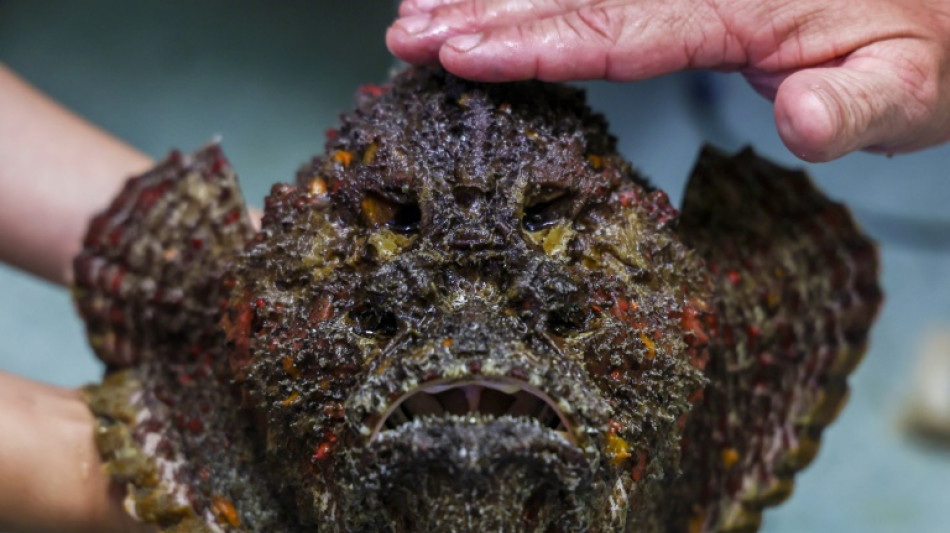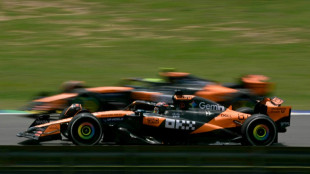
-
 Iran, US prepare for Oman talks after deadly protest crackdown
Iran, US prepare for Oman talks after deadly protest crackdown
-
Winter Olympics opening ceremony nears as virus disrupts ice hockey

-
 Mining giant Rio Tinto abandons Glencore merger bid
Mining giant Rio Tinto abandons Glencore merger bid
-
Davos forum opens probe into CEO Brende's Epstein links

-
 ECB warns of stronger euro impact, holds rates
ECB warns of stronger euro impact, holds rates
-
Famine spreading in Sudan's Darfur, warn UN-backed experts

-
 Lights back on in eastern Cuba after widespread blackout
Lights back on in eastern Cuba after widespread blackout
-
Russia, US agree to resume military contacts at Ukraine talks

-
 Greece aims to cut queues at ancient sites with new portal
Greece aims to cut queues at ancient sites with new portal
-
No time frame to get Palmer in 'perfect' shape - Rosenior

-
 Stocks fall as tech valuation fears stoke volatility
Stocks fall as tech valuation fears stoke volatility
-
US Olympic body backs LA28 leadership amid Wasserman scandal

-
 Gnabry extends Bayern Munich deal until 2028
Gnabry extends Bayern Munich deal until 2028
-
England captain Stokes suffers facial injury after being hit by ball

-
 Italy captain Lamaro amongst trio set for 50th caps against Scotland
Italy captain Lamaro amongst trio set for 50th caps against Scotland
-
Piastri plays down McLaren rivalry with champion Norris

-
 ECB holds interest rates as strong euro causes jitters
ECB holds interest rates as strong euro causes jitters
-
Spain, Portugal face floods and chaos after deadly new storm

-
 EU close to sealing trade deal with Australia
EU close to sealing trade deal with Australia
-
German Cup final to stay in Berlin until 2030

-
 What does Iran want from talks with the US?
What does Iran want from talks with the US?
-
Taming the lion: Olympians take on Bormio's terrifying Stelvio piste

-
 Wind turbine maker Vestas sees record revenue in 2025
Wind turbine maker Vestas sees record revenue in 2025
-
Italy's Casse tops second Olympic downhill training

-
 Anti-doping boss 'uncomfortable' with Valieva's coach at Olympics
Anti-doping boss 'uncomfortable' with Valieva's coach at Olympics
-
Bitcoin under $70,000 for first time since Trump's election

-
 'I am sorry,' embattled UK PM tells Epstein victims
'I am sorry,' embattled UK PM tells Epstein victims
-
England's Brook predicts record 300-plus scores at T20 World Cup

-
 Ukraine, Russia swap prisoners, US says 'work remains' to end war
Ukraine, Russia swap prisoners, US says 'work remains' to end war
-
Wales' Rees-Zammit at full-back for Six Nations return against England

-
 Sad horses and Draco Malfoy: China's unexpected Lunar New Year trends
Sad horses and Draco Malfoy: China's unexpected Lunar New Year trends
-
Hong Kong students dissolve pro-democracy group under 'severe' pressure

-
 Germany claws back 59 mn euros from Amazon over price controls
Germany claws back 59 mn euros from Amazon over price controls
-
Germany claws back 70 mn euros from Amazon over price controls

-
 VW and Stellantis urge help to keep carmaking in Europe
VW and Stellantis urge help to keep carmaking in Europe
-
Stock markets drop amid tech concerns before rate calls

-
 BBVA posts record profit after failed Sabadell takeover
BBVA posts record profit after failed Sabadell takeover
-
UN human rights agency in 'survival mode': chief

-
 Greenpeace slams fossil fuel sponsors for Winter Olympics
Greenpeace slams fossil fuel sponsors for Winter Olympics
-
Greenpeace slams fossel fuel sponsors for Winter Olympics

-
 Kinghorn, Van der Merwe dropped by Scotland for Six Nations opener
Kinghorn, Van der Merwe dropped by Scotland for Six Nations opener
-
Russia says thwarted smuggling of giant meteorite to UK

-
 Salt war heats up in ice-glazed Berlin
Salt war heats up in ice-glazed Berlin
-
Liverpool in 'good place' for years to come, says Slot

-
 Heathrow still Europe's busiest airport, but Istanbul gaining fast
Heathrow still Europe's busiest airport, but Istanbul gaining fast
-
Highest storm alert lifted in Spain, one woman missing

-
 Shell profits climb despite falling oil prices
Shell profits climb despite falling oil prices
-
Pakistan will seek govt nod in potential India T20 finals clash

-
 China shuns calls to enter nuclear talks after US-Russia treaty lapses
China shuns calls to enter nuclear talks after US-Russia treaty lapses
-
German factory orders rise at fastest rate in 2 years in December

| SCS | 0.12% | 16.14 | $ | |
| BP | -2.93% | 38.085 | $ | |
| NGG | -1.02% | 86.905 | $ | |
| CMSD | 0.17% | 23.91 | $ | |
| BTI | 0.08% | 61.68 | $ | |
| RIO | -4.49% | 92.33 | $ | |
| RBGPF | 0.12% | 82.5 | $ | |
| GSK | 3.34% | 59.21 | $ | |
| RYCEF | -0.36% | 16.62 | $ | |
| AZN | 1.06% | 189.46 | $ | |
| CMSC | -0.15% | 23.485 | $ | |
| BCE | -2.85% | 25.61 | $ | |
| BCC | -0.92% | 89.41 | $ | |
| JRI | 1.46% | 13.345 | $ | |
| VOD | -6.47% | 14.755 | $ | |
| RELX | 2.36% | 30.5 | $ |

Milking venom from Australia's deadly marine animals
Imagine feeling like an elephant is sitting on your chest, you can't breathe, there's a sense of impending doom and the pain is so intense you want to die.
You've just been stung by a tiny Irukandji jellyfish.
While you are unlikely to die, toxicologist Jamie Seymour of James Cook University in Australia says you'll wish you had.
He should know -- he's been stung 11 times.
But Seymour's job is riskier than most: milking sea creatures of their venom to create life-saving antivenoms.
Dozens of Irukandji jellyfish, some no bigger than a sesame seed, float in tanks inside a metal shed kept by the university in the state of Queensland.
In another tank, there are the most venomous fish in the world: the stonefish.
If its spines pierce your skin, the pain will cause you to lose consciousness and the area around the wound will turn black and die.
The stonefish's venom is powerful enough to kill humans, but there have been no recorded fatalities in Australia. Seymour is also among those who have survived its sting.
His team is studying Australia's deadliest marine animals in a bid to understand them and keep people safe.
"Australia is without a doubt the most venomous continent in the world," Seymour told AFP.
"When you talk to people, especially Americans, they're surprised that we don't all die at birth."
As Seymour moves around the tanks, he points out other deadly animals, including a box jellyfish which can kill a person within 10 minutes with its poison.
- Stings and bites -
Despite the countless venomous animals across Australia, fatalities are relatively rare.
The latest official data show that between 2001 and 2017, there were an average of 32 animal-related deaths a year, with horses and cows the biggest killers.
Since 1883, there have been only two recorded deaths from Irukandji jellyfish and about 70 deaths from box jellyfish.
By comparison, there were about 4,700 deaths from drug, alcohol and vehicle-related incidents in Australia in 2022 alone, according to government data.
"So, the chances of you being stung by an animal in Australia -- or bitten -- is reasonable, but the chances of dying very small," Seymour said.
His facility is the only one that milks venom from these deadly marine animals and turns it into antivenom.
For the deadly box jellyfish, that process is tricky. Researchers must remove their tentacles, freeze-dry them and collect the venom once it solidifies.
There's no antivenom for the Irukandji jellyfish.
Instead, doctors treat each symptom as it appears. If you get rapid medical advice, the chance of survival is high.
For the stonefish, the venom extraction process is more challenging.
Researchers insert a syringe into a live fish's venom glands, holding it with a towel while they withdraw a thimble full of the deadly fluid.
They then send the venom to a facility in the state of Victoria which processes it into life-saving antivenom.
First, the facility staff inject a small amount of venom over six months into an animal, such as a horse, which produces natural antibodies.
The animal's plasma is later removed and the antibodies are extracted, purified and reduced into an antivenom for humans.
- Deadly jellies -
Antivenoms are shipped to hospitals around Australia and some Pacific islands, where they can be administered if someone is stung or bitten by an animal.
"We have some of the best antivenoms in the world, there is no doubt about that," Seymour told AFP, noting the time and effort put into producing the serums in Australia.
And antivenom may be increasingly needed, as climate change can raise the risk of a sting, according to scientists.
About 60 years ago, the Irukandji jellyfish stinging season in Australia was in November and December.
With ocean temperatures staying warmer for longer, now the jellyfish can linger as late as March.
Warming oceans are also pushing these deadly sea jellies -- and other marine animals -- further south along the Australian coast.
Seymour's students have found that temperature changes can also alter the toxicity of venom.
"For example, if I make an antivenom for an animal at 20 degrees and I get bitten by an animal that lives in the wild at 30 degrees, that antivenom isn't going to work," he said.
Studies have also shown that venom from stinging creatures could be used to treat myriad health conditions, including one in which rheumatoid arthritis was effectively cured in mice in two weeks.
But this area of research remains largely unfunded, and Seymour says his work continues.
"When you think of the venom, think of it like a vegetable stew. There's a whole heap of different components that are in there," he said.
"What we've been trying to do is pull these things apart and work out what's going on."
B.AbuZeid--SF-PST




